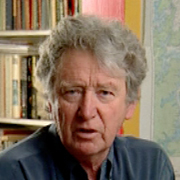
Keith Hunter
Although best known for his investigations into miscarriages of justice, Keith Hunter's work for the screen has ranged widely: from arts and current affairs reporting, to directing drama, comedy and documentaries on everything from wild horses to Auckland radio.
After studying Music, Latin and German at Auckland University, Hunter joined the NZ Broadcasting Corporation in 1966 as a researcher on magazine show Town and Around. By night he was playing trumpet in the forerunner to the Auckland Philharmonia. Later Hunter became a reporter/director on arts and current affairs documentary shows in both Auckland and Wellington. He won his first Best Programme award in 1972 for You Can't Always Get What You Want, an investigative documentary on rackets in the car market.
Hunter then joined director Bruce Morrison on arts show Review, and documentary series Encounter. Late in 1975 Hunter, Morrison and Keith Ballantyne formed indie company Sprocket Films. Hunter and Morrison directed two nature documentaries together, one of which — 1977's deer hunting doco Red Deer — sold well overseas, after being recut specifically for different international audiences. Hunter would return to natural history in the 90s with the spectacular NHNZ doco Wild Horse Wild Country.
Hunter's drama work includes early soap Radio Waves and rural police series Mortimer's Patch. For the first two seasons of Mortimer, he also produced and co-wrote the incidental music. Later he went on to direct for fellow cop show Shark in the Park, and comedy Letter to Blanchy.
From 1986 Hunter went freelance as a director/producer, and won awards for a series of documentaries focusing on legal issues. These include The Remand of Ivan Curry (1992), about a deaf man imprisoned on remand for two years for an alleged murder that turned out to be an accidental death caused by someone else; and Out of the Dark (1996), on the police hunt for 'South Auckland Rapist' Joseph Thompson.
November 2003 saw the debut of award-winning doco Murder on the Blade?, in which Hunter outlined his doubts about the Scott Watson case. The documentary won high ratings despite a blackout on print publicity, which Hunter says was taken to minimise the chances of a potential court injunction. Hunter realised halfway through making the film that it was best restructured as a personal point of view-style documentary. It was the first time he'd gone back in front of the camera in almost three decades. Pres reviewer Jane Clifton called the 90-minute doco "riveting".
Murder on the Blade? won a 2005 TV Award for Best Documentary. Hunter published his first book Trial by Trickery the following year, because the documentary had "failed to elicit a response from the 'System'" The book further critiques the handling of the Watson case. Hunter arranged the book's publication himself, after Penguin Books decided it was too hot to handle. In October 2009 Scott Watson presented the book and film to the Governor-General as documentation in an unsuccessful petition for a pardon.
Hunter has been vigorous in defending his take on the case, complaining (unsuccessfully) to the NZ Media Council about a 2018 Newsroom opinion piece which argued Watson was guilty, and threatening legal action again rival author Ian Wishart and book distributors over the possibility that Wishart had defamed him.
April 2012 saw the publication of Hunter's book The Case of the Missing Bloodstain, about the 1970 murders of Harvey and Jeanette Crewe. The book accuses former detective Bruce Hutton, who led the original investigation, of planting evidence aganst Arthur Alan Thomas, and "continually and unconscionably" deceiving others during and after the inquiry.
Hunter's other documentaries include The Ruapehu Affair, which follows a group of soldiers who refused to return to duty during WWll, The Rate Race, which goes behind the scenes in looks into 80s-era Auckland radio, and Māori - The Crisis and the Challenge in which Alan Duff offers his views on the influence of alcohol and violence on many contemporary polynesians and Māori.
Hunter also directed one-off drama Staunch in 2000, about a young Māori woman defending herself against assault charges brought by the police. Hunter wrote the script with rising talent Toa Fraser, the drama marked a rare central role for Mamaengaroa Pere (née Kerr-Bell), who had made an impressive debut in Once Were Warriors. In 2008 he directed tele-play New Brew at Brewster Street, as part of Māori Television anthology series The Table Plays.
In 1997 Hunter became founding president of the Screen Directors' Guild of New Zealand, a post he held for four years.
Profile updated on 27 August 2020
Sources include
Hunter Productions website. Accessed 27 August 2020
Jane Clifton, 'Time for Dr Halifax to do a Rapunzel' (Review of Murder on the Blade?) - The Press, 15 November 2003, page B7
David Fisher, 'Ian Wishart's new book pulled from shelves' - The NZ Herald, 29 January 2016
Roger Horrocks, ‘New Zealand Film Makers at the Auckland City Art Gallery: Bruce Morrison' (Catalogue) 1985
'Keith Hunter Against Newsroom and Stuff' New Zealand Media Council website. Accessed 27 August 2020